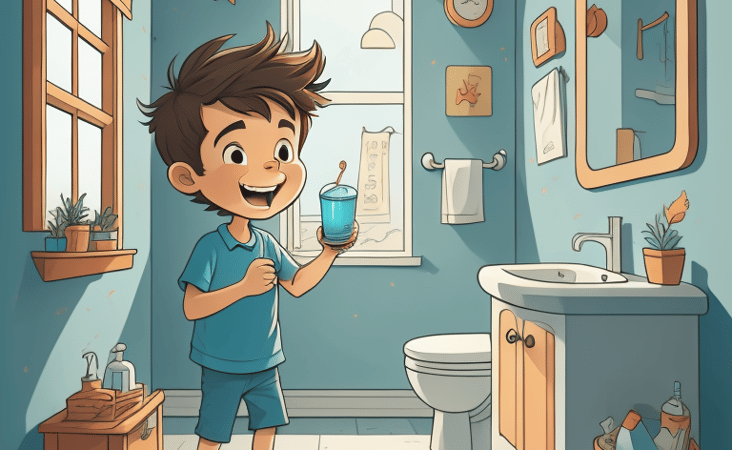Choosing the Best Mouthwash for Children: Tips and Recommendations


Parents want the best for their children, and that should include ensuring their oral health is in top shape. While regular brushing and flossing are essential, incorporating mouthwash into your child's oral care routine can provide additional benefits. However, choosing the right mouthwash for children requires some consideration. In this comprehensive guide, we'll explore the importance of mouthwash for kids, the types available, and how to use them safely and effectively.
Why Use Mouthwash for Children?
1. Extra Protection Against Cavities
Children are susceptible to cavities, and using an appropriate mouthwash can provide an extra layer of protection. Some mouthwashes designed for kids contain fluoride, a mineral that strengthens tooth enamel and helps prevent tooth decay.
2. Fresh Breath Confidence
Kids can be sensitive about their breath, and using a child-friendly mouthwash can boost their confidence. Mouthwash helps freshen breath, providing a clean and pleasant feeling.
3. Enhanced Gum Health
Mouthwash can also contribute to healthier gums. It can help reduce bacteria that may lead to gum disease, making it an important part of a comprehensive oral care routine.
Types of Mouthwashes for Children
When choosing a mouthwash for your child, it's crucial to select one that's suitable for their age and needs. Here are the main types of mouthwashes for children:
1. Fluoride Mouthwash:
Fluoride is a mineral that strengthens tooth enamel, making it more resistant to acid attacks and tooth decay. Fluoride mouthwash for kids is an excellent choice for cavity prevention. Ensure that the product is specifically designed for children and follow the recommended usage guidelines to prevent accidental swallowing.
2. Alcohol-Free Mouthwash:
Alcohol-free mouthwashes are gentle on the delicate tissues in a child's mouth. They provide the benefits of mouthwash without the potential discomfort of alcohol. These mouthwashes are suitable for most children and are often recommended for younger kids.
3. Natural and Herbal Mouthwash:
Some parents prefer natural and herbal mouthwash options for their children. These products use ingredients like aloe vera, chamomile, and tea tree oil to provide oral care benefits without synthetic additives. Always check the label for age-appropriate recommendations.
4. Antiseptic Mouthwash:
Antiseptic mouthwashes for children contain ingredients that can help reduce harmful bacteria in the mouth. They are especially useful for kids with a higher risk of gum disease or dental infections. However, these should be used under the guidance of a dentist, as they may not be suitable for all children.
5. Pre-Brushing and After-Brushing Rinses:
Some mouthwashes are designed to be used before or after brushing. Pre-brushing rinses can help loosen food particles and debris, making brushing more effective. After-brushing rinses provide additional fluoride and protection after brushing.
How to Use Mouthwash for Children
Proper usage of mouthwash is essential to maximize its benefits and ensure your child's safety:
1. Choose the Right Product:
Select a mouthwash that is appropriate for your child's age and specific needs. Always check the label for age recommendations.
2. Follow the Instructions:
Read and follow the manufacturer's instructions carefully. Pay attention to the recommended dosage and usage frequency.
3. Supervise Young Children:
For younger children, especially those under the age of six, it's important to supervise them while using mouthwash to prevent accidental swallowing. Encourage them to spit out the mouthwash after swishing.
4. Use the Right Amount:
Measure the appropriate amount of mouthwash using the provided cap or dispenser. Using too much mouthwash can be uncomfortable and may lead to accidental ingestion.
5. Timing Matters:
Encourage your child to use mouthwash at the recommended time, which is typically after brushing and flossing. It's best to use it at a time when they won't be eating or drinking immediately afterward.
6. Avoid Eating or Drinking After Use:
Explain to your child that they should refrain from eating or drinking for at least 30 minutes after using mouthwash. This allows the active ingredients to work effectively.
Safety Considerations
While mouthwash can be beneficial for children, it's important to keep these safety considerations in mind:
1. Supervision is Key:
Children should be supervised when using mouthwash, especially if they are under the age of six. Accidental ingestion can be harmful.
2. Prevent Swallowing:
Teach your child to swish the mouthwash in their mouth and spit it out, not swallow it. Ensure they understand that it's not meant for swallowing.
3. Store Safely:
Store mouthwash out of reach of young children to prevent accidental ingestion. Childproof caps can also be helpful.
4. Contact a Dentist:
If you have concerns about which mouthwash is right for your child or their oral health, consult with a pediatric dentist. They can provide personalized recommendations and guidance.
Conclusion
Incorporating mouthwash into your child's oral care routine can be a valuable step in maintaining their oral health. By choosing the right mouthwash for their age and specific needs, following proper usage guidelines, and emphasizing safety, you can help your child enjoy the benefits of fresh breath and cavity prevention. Remember that mouthwash is not a replacement for regular brushing and flossing; it complements these essential oral care practices. Encourage your child to embrace good oral hygiene habits from an early age, setting the foundation for a lifetime of healthy smiles.
